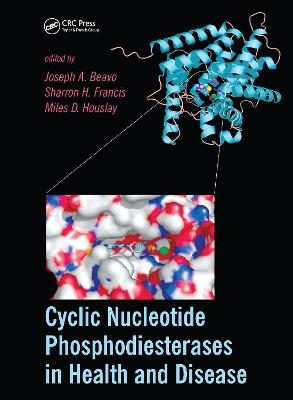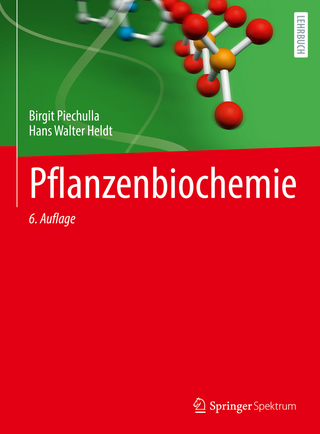
Cyclic Nucleotide Phosphodiesterases in Health and Disease
CRC Press (Verlag)
978-0-367-45332-9 (ISBN)
Cyclic Nucleotide Phosphodiesterases in Health and Disease provides an integrated volume covering PDE biology from genes to organisms. It examines phosphodiesterases as pharmacological targets as well as the development of specific PDE inhibitors as therapeutic agents. With contributions from pioneers in the field, individual chapters describe one of the 11 known mammalian PDE families including the molecular characteristics, structure, function, and traits unique to each. Characteristics of PDEs from lower organisms are also the subject of other chapters since they provide key insights into PDE functions and are also pharmacological targets for treatment of a variety of diseases in humans and domestic animals. Chapters on the current biomedical and therapeutic research on PDEs include studies on gene-targeted knockout strategies and compartmentation in cyclic nucleotide signaling. By unraveling the unique cellular roles for different PDEs, scientists are beginning to open the door to the therapeutic use of PDE inhibitors for the treatment of a number of pathological conditions including asthma and inflammation, pulmonary hypertension, erectile dysfunction, and stroke.
By collating current information into a coherent and coordinated perspective, Cyclic Nucleotide Phosphodiesterases in Health and Disease provides an invaluable reference for industry and clinical scientists and points toward future directions of research and therapeutic advancements in developing selective inhibitors for these various enzymes.
Joseph A. Beavo is a professor of pharmacology at the University of Washington. He obtained a BS from Stetson University in Deland, Florida and then a PhD from Vanderbilt University in Nashville, Tennessee. He has been involved in research concerning cyclic nucleotide phosphodiesterases since his graduate work with Drs. Joel Hardman and Earl Sutherland in the 1960s. He is an active member of the American Society for Pharmacology and Experimental Therapeutics and the National Academy of Sciences, having served on the editorial boards of journals published by both organizations. His current research focuses on the structural mechanisms of regulation of cyclic nucleotide phosphodiesterases and also on the functional roles played by the different phosphodiesterase gene products. Sharron H. Francis is a research professor of molecular physiology and biophysics at Vanderbilt University School of Medicine in Nashville, Tennessee. She obtained her undergraduate degree with emphasis in biology and chemistry from the Western Kentucky State in Bowling Green; studies for her doctoral degree in physiology were performed at Vanderbilt University under the guidance of Jane Park, PhD. She did postdoctoral study with Dr. Herman Eisen at Washington University in St. Louis, Missouri and was a research fellow in the Laboratory of Biochemistry at the National Heart and Lung Institute in Bethesda, Maryland under the guidance of Earl Stadtman, PhD. She is an active member of the American Society for Biochemistry and Molecular Biology, served the Scientific Advisory Board for Cell Pathways, Inc., and also has served as a consultant for numerous pharmaceutical companies. Her research interests focus on mechanisms involved in cGMP signaling, molecular characteristics of cGMP-dependent protein kinase, and phosphodiesterase-5, which are targets of cGMP, and the features that contribute to potent inhibition of phosphodiesterase- 5 by selective inhibitors. Miles D. Houslay is a Gardiner professor of biochemistry at the University of Glasgow, Scotland, UK. He obtained his first degree in biochemistry at the University of Wales in Cardiff and then his PhD from King’s College, Cambridge. He has held faculty positions at the Universities of Cambridge and Manchester. He is a fellow of the Royal Society of Edinburgh, Colworth Medal Holder of the British Biochemical Society, has served as member= chair of numerous grant agencies, and has consulted widely in the pharmaceutical industry. He has been involved in cell signaling research since its inception. His current research interest is focused on the role of phosphodiesterase-4 isoforms in underpinning cAMP compartmentalization and cross-talk processes and potential for identifying novel therapeutic opportunities.
Specific Phosphodiesterase Families—Regulation, Molecular and Biochemical Characteristics, Nonmammalian Phosphodiesterases, Phosphodiesterases Functional Significance: Gene-Targeted Knockout Strategies, Compartmentation in Cyclic Nucleotide Signaling, Phosphodiesterases as Pharmacological Targets in Disease Processes, Development of Specific Phosphodiesterase Inhibitors as Therapeutic Agents, Index
| Erscheinungsdatum | 03.12.2019 |
|---|---|
| Zusatzinfo | 35 Tables, black and white; 32 Halftones, black and white; 250 Illustrations, black and white |
| Verlagsort | London |
| Sprache | englisch |
| Maße | 178 x 254 mm |
| Gewicht | 453 g |
| Themenwelt | Medizin / Pharmazie |
| Naturwissenschaften ► Biologie ► Biochemie | |
| Naturwissenschaften ► Biologie ► Genetik / Molekularbiologie | |
| Technik | |
| ISBN-10 | 0-367-45332-0 / 0367453320 |
| ISBN-13 | 978-0-367-45332-9 / 9780367453329 |
| Zustand | Neuware |
| Haben Sie eine Frage zum Produkt? |
aus dem Bereich


